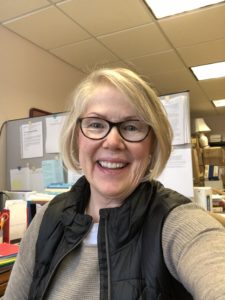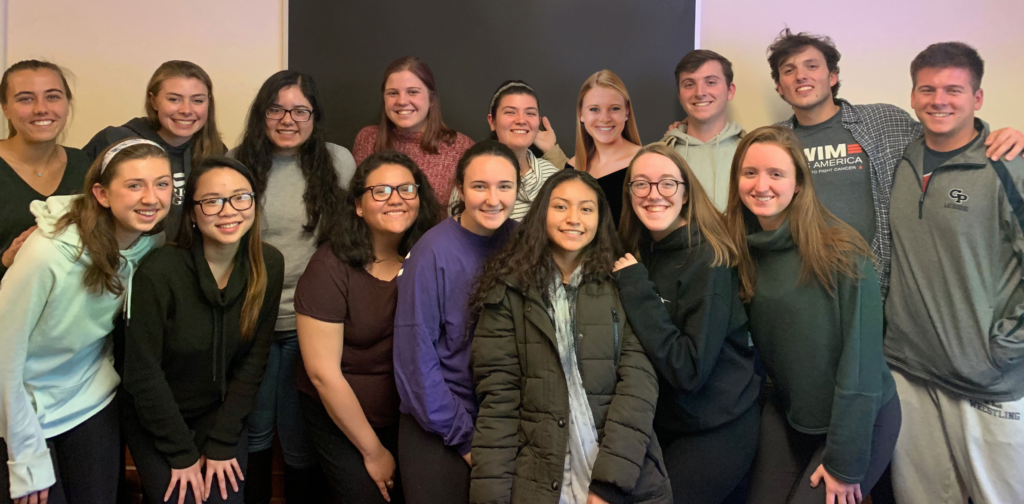This year, we have collectively felt an overwhelming sense of loss: for lives cut short by illness and injustice; for weddings, birthdays, and holidays celebrated without friends and family close by; and for all that was interrupted and all that could have been. This year has been heartbreaking, and it has been so challenging to remain productive in the midst of it all. I struggled to feel settled at the beginning of this semester. The class structures were unfamiliar, all aspects of extracurricular life remained uncertain for weeks, and I sorely missed the comforts of our campus that I had been taking for granted. However, I found resilience in community, and I’m particularly grateful to the Donelan Office. They have been a source of constant warmth and growth throughout my time at Holy Cross, and in spite of everything, this semester was no different. I have relied heavily on the patience and kindness of Isabelle, Michelle, and the other Interns. Rather than our biweekly meetings adding to my Zoom fatigue, I have come away from each and every Intern meeting feeling refreshed.
I’m especially thankful that leaders from the J.D. Power Center, the Chaplains’ Office, and OME among other faculty members worked together to build a new, virtual space for peer connection and continued civic engagement: the Civitas Leadership Institute. In our current times, we love each other best by maintaining our distance, but what does this mean for our commitment to be “for and with others”? The COVID-19 pandemic has been a heightened call to support those in need, but how can we be spiritually together while we are physically alone? The concept of civitas calls us to consider the responsibilities we have for other members of our shared communities, and the Leadership Institute served as a gathering place to find hope, strength, and direction with one another. Consisting of a month-long series of conversations about service and justice, Civitas encouraged us to be contemplatives in action. We considered how to best live out the Jesuit mission, we heard about ways we can organize in order to bring about equitable change, and we reflected upon where we can find hope in challenging times. The Civitas Leadership Institute demonstrated that we can continue to live a life of service and justice even when more traditional engagement avenues are unavailable.
Through my time as a CBL Intern and as a student in the AIP seminar on Nonprofits and Government Agencies, I had already participated in multiple discussions about the topics that the Institute covered. However, this material becomes no less impactful over time; it is valuable to continue to learn about social justice concerns because with each re-read and new discussion, I am able to gain novel insights. During the Institute, I connected most deeply to the content about hope. There have been considerable setbacks politically, economically, and socially, and it’s been hard to remain hopeful. Michelle’s reflection on perseverance has stayed with me throughout the past month; hope is not magic nor a cure-all, but it is critical for continuing the difficult work we are called to do.
Although the Civitas Leadership Institute looked very different from my community engagement in past semesters, it still provided a space for contemplation. In my reflection, I’ve realized that despite the many negative aspects of this year, I still have a lot to be thankful for. This is not to suggest that anyone should rush their grieving process and adopt an attitude of blind optimism; we should feel it all — the frustration, the disillusionment, the overwhelming anxiety — for as long as it is healthy. Once we have grieved, we can begin to see how some of our losses have come back to us as gifts. Personally, I am grateful for hours-long Zoom calls with friends and family who live far away; although we have had the technology for years, we never actually used it before now. I am grateful that I was able to spend nine more months living with my older brother before he moved away. I am grateful for home-cooked meals, for the ability to bake desserts every weekend, and especially for the Dunkin’ Donuts five minutes from my house. Nothing about this year has been what any of us envisioned, but there are still patches of joy, warmth, and gratitude to be found. For all the grief we are collectively shouldering, this year has, at the very least, reminded us of our civic responsibility to ensure one another’s safety and comfort. We are members of the same community, and fundamentally, we belong to each other.



